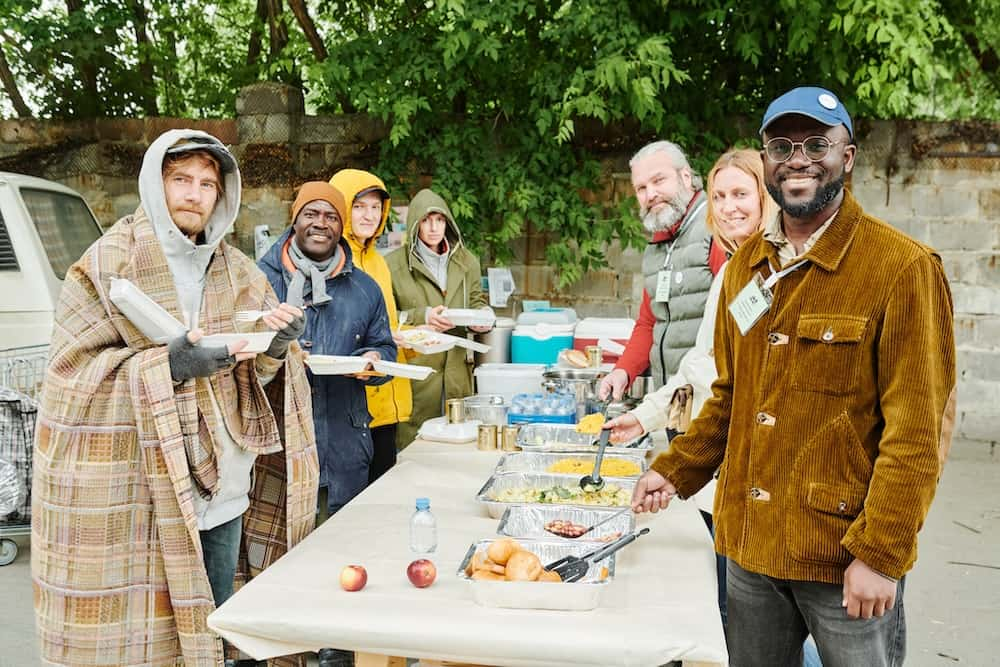How to Quickly Create a Communication Strategy for Your Church
Reaching people with your message is easier said than done. But here's a plan you can use to promote your message.

Reaching people with your message is easier said than done.
The people you are trying to reach are bombarded with a slew of messages every day.
From text messages and emails to social media and advertisements, they are swimming in a sea of information.
To cut through this clutter and rise above the noise, you don’t need an uber creative idea or a multi-million dollar budget.
All your church needs is a communication strategy.
Here are four questions you need to answer to develop a communication strategy for any event.
#1. What do I need to share?
The first step you need to take in improving your church’s communication is to determine what you’re sharing.
Do you need to let the people in your community know about your weekend worship services? Do you need to encourage more people within your church to join a small group? Is there a special event taking place that people within and outside of the church need to know about?
Before you share anything with someone in your church or community, you need to clarify what it is they need know. Here are some details you need to know:
- Date
- Time
- Location
Outside of this, other details to think about — especially for events — is whether or not someone needs to RSVP or if they need to bring anything with them.
Alright, after you know what you’re going to share, you’re ready to share it with your church or community.
#2. Who needs to know?
So, who needs to hear what you have to say?
If you’re talking about your worship services, then it’s important to not only keep your church informed but to inform your community as well. If you are promoting small groups, then this is a ministry primarily targeted to church members or visitors. Now, if you’re organizing a special event for the community, then you need to think about how you best position your message for them.
The following questions will help you to clarify your target audience better:
- What is their gender?
- How old are they?
- What is their profession?
- What is their level of education
These are just some preliminary questions you can ask, but they will serve as a launching to defining your audience.
#3. Where are they?
Where are the people you are trying to reach?
If you are sharing an announcement for your church, then you know what channels you can use to reach them, such as weekly announcements, bulletins, and emails.
Now, if you are trying to reach people in your community, what channels do you have available? Do you have a marquee you can use? Are there businesses in your community where you can up posters promoting an event? Are there neighborhoods you can canvas by knocking on their doors? What social media channels do they use? Is there a place on your website you can update?
During this step, it’s important to focus your message on your target audience. If you are trying to reach people in your community with a message, then it’s probably best to make your announcement beyond the four walls of your church building.
#4. Did anyone listen?
Did you accomplish your goal? Was the event you needed to promote attended?
Analyzing your results is an easy step to overlook. For instance, if you organized a back-to-school event and your goal was to reach 100 people in your community, was your event attended by this many people? If not, why not? If so, what were effective strategies you used?
Knowing what does and doesn’t work will inform the tactics you use the next time you need to promote an event.
Sign Up for Product Updates
Reaching people with your message is easier said than done.
The people you are trying to reach are bombarded with a slew of messages every day.
From text messages and emails to social media and advertisements, they are swimming in a sea of information.
To cut through this clutter and rise above the noise, you don’t need an uber creative idea or a multi-million dollar budget.
All your church needs is a communication strategy.
Here are four questions you need to answer to develop a communication strategy for any event.
#1. What do I need to share?
The first step you need to take in improving your church’s communication is to determine what you’re sharing.
Do you need to let the people in your community know about your weekend worship services? Do you need to encourage more people within your church to join a small group? Is there a special event taking place that people within and outside of the church need to know about?
Before you share anything with someone in your church or community, you need to clarify what it is they need know. Here are some details you need to know:
- Date
- Time
- Location
Outside of this, other details to think about — especially for events — is whether or not someone needs to RSVP or if they need to bring anything with them.
Alright, after you know what you’re going to share, you’re ready to share it with your church or community.
#2. Who needs to know?
So, who needs to hear what you have to say?
If you’re talking about your worship services, then it’s important to not only keep your church informed but to inform your community as well. If you are promoting small groups, then this is a ministry primarily targeted to church members or visitors. Now, if you’re organizing a special event for the community, then you need to think about how you best position your message for them.
The following questions will help you to clarify your target audience better:
- What is their gender?
- How old are they?
- What is their profession?
- What is their level of education
These are just some preliminary questions you can ask, but they will serve as a launching to defining your audience.
#3. Where are they?
Where are the people you are trying to reach?
If you are sharing an announcement for your church, then you know what channels you can use to reach them, such as weekly announcements, bulletins, and emails.
Now, if you are trying to reach people in your community, what channels do you have available? Do you have a marquee you can use? Are there businesses in your community where you can up posters promoting an event? Are there neighborhoods you can canvas by knocking on their doors? What social media channels do they use? Is there a place on your website you can update?
During this step, it’s important to focus your message on your target audience. If you are trying to reach people in your community with a message, then it’s probably best to make your announcement beyond the four walls of your church building.
#4. Did anyone listen?
Did you accomplish your goal? Was the event you needed to promote attended?
Analyzing your results is an easy step to overlook. For instance, if you organized a back-to-school event and your goal was to reach 100 people in your community, was your event attended by this many people? If not, why not? If so, what were effective strategies you used?
Knowing what does and doesn’t work will inform the tactics you use the next time you need to promote an event.
podcast transcript
Reaching people with your message is easier said than done.
The people you are trying to reach are bombarded with a slew of messages every day.
From text messages and emails to social media and advertisements, they are swimming in a sea of information.
To cut through this clutter and rise above the noise, you don’t need an uber creative idea or a multi-million dollar budget.
All your church needs is a communication strategy.
Here are four questions you need to answer to develop a communication strategy for any event.
#1. What do I need to share?
The first step you need to take in improving your church’s communication is to determine what you’re sharing.
Do you need to let the people in your community know about your weekend worship services? Do you need to encourage more people within your church to join a small group? Is there a special event taking place that people within and outside of the church need to know about?
Before you share anything with someone in your church or community, you need to clarify what it is they need know. Here are some details you need to know:
- Date
- Time
- Location
Outside of this, other details to think about — especially for events — is whether or not someone needs to RSVP or if they need to bring anything with them.
Alright, after you know what you’re going to share, you’re ready to share it with your church or community.
#2. Who needs to know?
So, who needs to hear what you have to say?
If you’re talking about your worship services, then it’s important to not only keep your church informed but to inform your community as well. If you are promoting small groups, then this is a ministry primarily targeted to church members or visitors. Now, if you’re organizing a special event for the community, then you need to think about how you best position your message for them.
The following questions will help you to clarify your target audience better:
- What is their gender?
- How old are they?
- What is their profession?
- What is their level of education
These are just some preliminary questions you can ask, but they will serve as a launching to defining your audience.
#3. Where are they?
Where are the people you are trying to reach?
If you are sharing an announcement for your church, then you know what channels you can use to reach them, such as weekly announcements, bulletins, and emails.
Now, if you are trying to reach people in your community, what channels do you have available? Do you have a marquee you can use? Are there businesses in your community where you can up posters promoting an event? Are there neighborhoods you can canvas by knocking on their doors? What social media channels do they use? Is there a place on your website you can update?
During this step, it’s important to focus your message on your target audience. If you are trying to reach people in your community with a message, then it’s probably best to make your announcement beyond the four walls of your church building.
#4. Did anyone listen?
Did you accomplish your goal? Was the event you needed to promote attended?
Analyzing your results is an easy step to overlook. For instance, if you organized a back-to-school event and your goal was to reach 100 people in your community, was your event attended by this many people? If not, why not? If so, what were effective strategies you used?
Knowing what does and doesn’t work will inform the tactics you use the next time you need to promote an event.
VIDEO transcript
Reaching people with your message is easier said than done.
The people you are trying to reach are bombarded with a slew of messages every day.
From text messages and emails to social media and advertisements, they are swimming in a sea of information.
To cut through this clutter and rise above the noise, you don’t need an uber creative idea or a multi-million dollar budget.
All your church needs is a communication strategy.
Here are four questions you need to answer to develop a communication strategy for any event.
#1. What do I need to share?
The first step you need to take in improving your church’s communication is to determine what you’re sharing.
Do you need to let the people in your community know about your weekend worship services? Do you need to encourage more people within your church to join a small group? Is there a special event taking place that people within and outside of the church need to know about?
Before you share anything with someone in your church or community, you need to clarify what it is they need know. Here are some details you need to know:
- Date
- Time
- Location
Outside of this, other details to think about — especially for events — is whether or not someone needs to RSVP or if they need to bring anything with them.
Alright, after you know what you’re going to share, you’re ready to share it with your church or community.
#2. Who needs to know?
So, who needs to hear what you have to say?
If you’re talking about your worship services, then it’s important to not only keep your church informed but to inform your community as well. If you are promoting small groups, then this is a ministry primarily targeted to church members or visitors. Now, if you’re organizing a special event for the community, then you need to think about how you best position your message for them.
The following questions will help you to clarify your target audience better:
- What is their gender?
- How old are they?
- What is their profession?
- What is their level of education
These are just some preliminary questions you can ask, but they will serve as a launching to defining your audience.
#3. Where are they?
Where are the people you are trying to reach?
If you are sharing an announcement for your church, then you know what channels you can use to reach them, such as weekly announcements, bulletins, and emails.
Now, if you are trying to reach people in your community, what channels do you have available? Do you have a marquee you can use? Are there businesses in your community where you can up posters promoting an event? Are there neighborhoods you can canvas by knocking on their doors? What social media channels do they use? Is there a place on your website you can update?
During this step, it’s important to focus your message on your target audience. If you are trying to reach people in your community with a message, then it’s probably best to make your announcement beyond the four walls of your church building.
#4. Did anyone listen?
Did you accomplish your goal? Was the event you needed to promote attended?
Analyzing your results is an easy step to overlook. For instance, if you organized a back-to-school event and your goal was to reach 100 people in your community, was your event attended by this many people? If not, why not? If so, what were effective strategies you used?
Knowing what does and doesn’t work will inform the tactics you use the next time you need to promote an event.
















.jpg)











